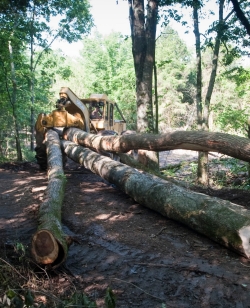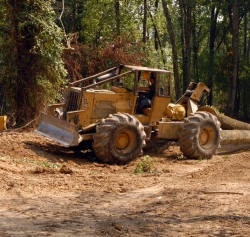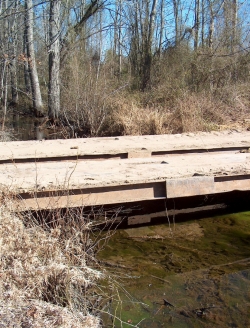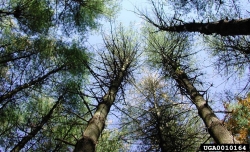Cost Share for Forest Industry
TAEP and SPBI for Forest Industry
Cost share programs administered by the Tennessee Department of Agriculture Division of Forestry are provided to assist forest landowners and industry with improving forest health and sustainability. The Tennessee Agricultural Enhancement Program (TAEP) is a direct result of Tennessee’s continued commitment to supporting rural and urban forest resources along with Tennessee’s agricultural community. The Southern Pine Beetle Initiative (SPBI) funds are provided by the USDA Forest Service and administered by the Tennessee Department of Agriculture Division of Forestry (TDF).
Click here to view information on Skidder Bridges and Pallet Mats.
SUMMARY
Forestry cost share programs under the Tennessee Agricultural Enhancement Program (TAEP) and Southern Pine Beetle Initiative (SPBI) were developed to promote long term investments in Tennessee’s forests by providing cost share incentives to qualifying landowners and forest industry. The programs help promote sustainable forest management practices by forest industry on private family-owned woodlands. These practices provide multiple resource benefits such as timber, wildlife habitat, clean water, and soil protection.
Forest industry practitioners, such as loggers and sawmill owners, are eligible to receive a 50% cost share reimbursement for funds spent. TAEP and SPBI each have a maximum reimbursement of up to $20,000 per year. Cost share assistance for forest industry is available for sign-up year-round. Interested industry participants should contact their local Area Forester to determine eligibility and complete the approval process 2 months prior to implementation.
Tennessee Agricultural Enhancement Program (TAEP) Best Management Practices Cost Share
TAEP Best Management Practices Cost Share is an incentive for timber harvesting or wood using industries to avoid or minimize negative environmental and water quality impacts, resulting from timber harvesting. Wood pallet mats, wood and steel skidder bridges, stream-crossing grids and rock, geotextile fabric, erosion EELS, and silt fences are included. The cost share amount is based on 50 percent of the participant’s eligible cost, not to exceed the maximum per unit. The maximum cost share for all TAEP practices is up to $20,000 per participant per year.
Eligibility
Eligible participants for forestry practices include timber harvesting companies; wood-using industries; and entities that derive more than 50 percent of their gross income from wood-using industries that cut and process standing timber in Tennessee. Participants must be Tennessee residents or be a business incorporated in Tennessee. Ineligible participants include private individuals; joint owners; corporations and non-profit organizations and groups not associated with wood-using industries. Ineligible participants also include federal, state, and local governments.
| COMPONENT DESCRIPTION |
COST SHARE RATE |
MAXIMUM PER UNIT |
|---|---|---|
| TEMPORARY STREAM CROSSING STRUCTURE (SKIDDER BRIDGE SPANS) |
||
| Wood or steel structures, used as temporary stream crossings for skidders; must meet design specifications and are to be removed upon completion of timber harvesting activities. |
50% |
$1,000 per structure Wood Skidder Bridge |
| 50% |
$4,000 per structure Steel Skidder Bridge |
|
| 50% |
A minimum of two 4 ft. wide structures must be purchased. |
|
| WET AREA CROSSING STRUCTURE (PALLET MATS) |
||
| Wood structures providing access across wet areas; must meet design specifications and are to prevent excessive rutting on timber harvest roads, structures are to be removed upon completion of timber harvesting activities. |
50% |
$325 per structure Pallet Mats |
| 50% |
Purchase of up to 30 structures is authorized per entity per year |
|
| EROSION STABILIZATION MATERIALS |
||
| Materials to stabilize sediment, resulting from stream-crossing activities on timber harvest sites. Allowable materials include stream-crossing stabilization grid, associated rock, geotextile soil protection fabric, erosion EELS/silt socks, and silt fences/ straw wattles/hay bales. |
50% |
$3,500 per crossing – stream crossing |
Southern Pine Beetle Initiative (SPBI) Risk Reduction Cost Share: Improving an Existing Stand
SPBI First Commercial Thinning Cost Share is an incentive for loggers to lower the risk of Southern Pine Beetle infestation by improving existing pine stands that may not be profitable because of the small acreage or long haul distance to a pine market. The cost share amount is based on 50 percent of the participant’s documented cost. The maximum cost share for all SPBI practices is up to $20,000 per participant per year.
Eligibility
Eligible stands for the 1st commercial thinning component must be 12 to 25 years of age and have an average basal area of at least 110 sq. ft. per acre. Eligibility is also based on stand size and distance to a pine market. Stands inside a 50 mile radius of a pine market must be 5-15 acres, inside a 100 mile radius must be 5-25 acres, and stands outside of a 100 mile radius must be 5-35 acres in size. Stand size includes all qualifying pine acreage on a tract of a single ownership.
| COMPONENT DESCRIPTION |
COST SHARE RATE |
MAXIMUM PER UNIT |
|---|---|---|
| FIRST COMMERCIAL THINNING |
||
| First commercial thinning of pine on small acreages; pine stands must be overstocked and capable of a healthy response to thinning; minimum stand size increases with distance to a pine market; the nearest pine market must be at least 50 miles; eligible acreage ranges from 5 to 35 acres. |
50% |
$1,800.00 per stand - first commercial thinning |



